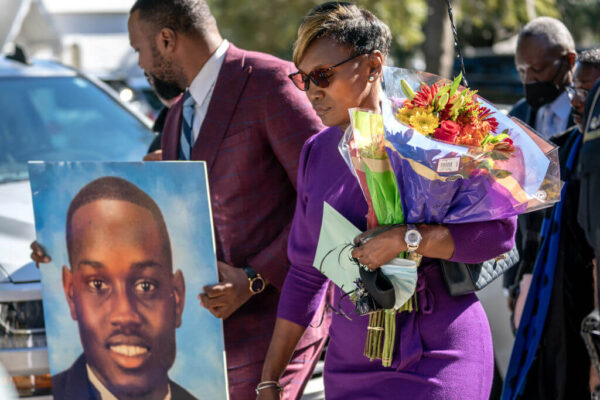Attorney Maintains Ahmaud Arbery’s Murderers Were ‘Motivated By Hate’ As They Attempt to Get Their Hate Crime Convictions Dismissed
As we look back on the death of Ahmaud Arbery, we are reminded of a vile murder that ruptured the faith of millions of Black Americans already weary from a history of racial injustice.
Arbery was shot to death on Feb. 23, 2020, after being racially profiled and followed by three white men in a South Georgia neighborhood.
Cellphone video showing two of those men armed in a truck and chasing down 25-year-old Arbery as he was jogging through the Satilla Shores subdivision just outside of Brunswick darkly resembled images of racial violence during the Jim Crow era, causing many to rethink where exactly race relations stand in America and demonstrating that the country isn’t very far from a time many thought was long past.
The heinous nature of Arbery’s murder drew fierce calls for justice from across the country, which was served more than a year after his death when a jury found Arbery’s killers guilty of murder alongside a slew of other charges.
Now, Greg and Travis McMichael and William “Roddie” Bryan will spend the rest of their lives in prison with no chance of parole.
All three were also found guilty and later sentenced for committing federal hate crimes, but now they’re currently working to get a judge to toss those convictions. Oral arguments are set to begin for those appeals on March 27 in a federal court in Atlanta.
Attorneys for Greg McMichael and Bryan argued that race wasn’t a factor in their pursuit of Arbery. Rather, they chased him because they really believed he was in the process of committing a crime.
The court filing for Travis McMichael’s appeal contests that prosecutors ultimately failed to prove that Arbery was killed on a public street, as stated in their indictment. One of the federal hate crimes he was convicted of was “using violence to intimidate and interfere with Arbery because of his race and because he was using a public street,” according to the U.S. Justice Department.
Prosecutors confirmed Arbery was shot on a street maintained by the county government, proving it wasn’t private property, according to the Associated Press. Moreover, they asserted that all three men had strongly held racist beliefs and found Arbery suspicious because he was Black.
“We anticipated the appeal from the moment that we secured a conviction,” Lee Merritt, the attorney for Arbery’s mother, told the Atlanta Black Star. “We don’t believe there’s any legal basis. If by some miracle, the court granted them a new trial on the federal hate crime charges, they’re still facing life for the equivalent on the state charges.”
Before they were convicted by a jury for their hate crimes, the McMichaels initially struck a deal with federal prosecutors agreeing to plead guilty to a single hate crime charge listed in a five-count indictment in exchange for a 30-year sentence in federal prison. It was an agreement the Arbery family strongly opposed.
That deal would have allowed them to serve time in federal prison before being transferred to a state prison where conditions are poorer and less accommodating.
Merritt said those plea bargain agreements included a stipulation in which the McMichaels waived the right to appeal their convictions, but a federal judge ended up rejecting Travis McMichael’s deal, expressing discomfort with the sentencing guidelines.
The McMichaels and Bryan were eventually all found guilty of multiple federal hate crimes in a trial separate from their murder trial. All of them are serving out their sentences for those crimes in state prisons. They are still allowed to appeal and are currently in the process of doing so.
“The conviction at the federal level was as important as the conviction at the state level, although the family was particularly interested in state-level convictions because we believe these men should be serving their time as they are in state prisons instead of federal prisons,” Merritt said.
“They were motivated by hate. We know that from both trials at every level,” he added.
What no one expected was that Arbery’s death would precede the high-profile police killings of Breonna Taylor and George Floyd, which intensified the national outcry against police brutality. All four officers involved in Floyd’s murder were convicted on both state and federal charges. Former Minneapolis police officer Derek Chauvin was the only one found guilty of murder.
Taylor’s case, on the other hand, has reaped no convictions. Federal prosecutors are preparing to embark on their third attempt to convict former Louisville police officer Brett Hankison for his actions during a botched raid at Taylor’s apartment.
Merritt said while he felt “relief” that he was able to get the Arbery family justice, other families are still suffering. He added that cases like Arbery’s are continuing to happen over and over again because the system is operating in the framework it always has.
“There are a lot of families who have stories that you never hear about – stories of racial violence, stories of police violence, stories of prosecutorial misconduct. Because the system is designed to produce that kind of outcome over and over again, cases like Ahmaud will unfortunately continue to happen,” Merritt said.
“My concern is that, similar to the conviction of officers who participated in the murder of George Floyd, people will see the outcome and say, ‘Well, the system seems to be working, everything’s fine,’ instead of understanding the fact that this case exists is an indication that the system is not working and that race relations are at a low.”

